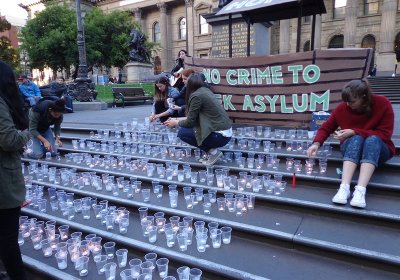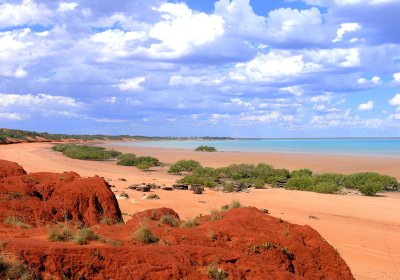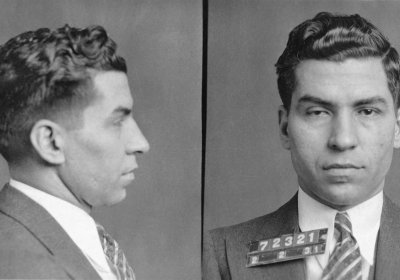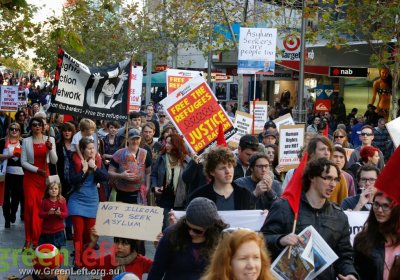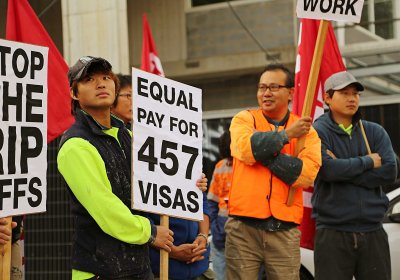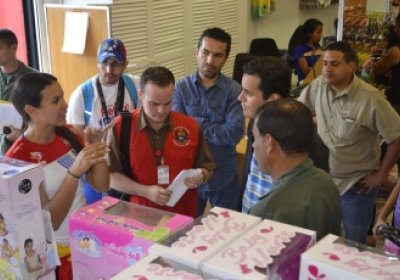New at LINKS International Journal of Socialist Renewal. Video: Do we need anti-capitalist governments? and 'Growth imperative' versus 'climate imperative.
Issue 989
News
A protest against using the Victorian port of Hastings for brown coal exports attracted 200 people on November 9, including locals and community members from across Gippsland.
Several coal export projects are seeking to use land at Hastings in Western Port, south-east of Melbourne, for a one-square-kilometre brown coal drying facility and port.
"Never before in the history of Latin America have there been such a number of left-wing governments in power at the same time," Steve Ellner, a visiting fellow at the Australian National University and professor in economic history at the Eastern University in Puerto La Cruz, Venezuela, told a public forum in Sydney on November 9.
The forum was organised by the Latin America Social Forum (LASF) and also featured Sarah Motta, senior lecturer in politics at the University of Newcastle. Both speakers had edited editions of the journal Latin American Perspectives earlier this year.
The newly formed Illawarra Aboriginal Solidarity Group will hold a launch on November 21 with the screening of two films at Wollongong TAFE.
The Illawarra region has a strong history of activism around the injustices that Indigenous people face, including past campaign work by the South Coast Aboriginal Advancement League and the Illawarra Aboriginal Rights Group.
Lyle Davis, a Brierley/Piety/Dharawal man, emphasises that while this is the launch of a new group it is continuing on with work that has taken place for many years.
Vocational education has become one of the fastest growing markets in Australia. There are more than 5000 private providers; half receive government funding and many accrue enormous profits.
This huge rise in private providers has made it impossible for the regulatory system to adequately police them, so there is little guarantee of the quality of courses.
But federal and state governments have embraced private providers' “user-pays” ideology rather than commit to free, high-quality public education for all as a human right.
Debate on a dangerous bill that seeks to redefine when life begins was again suspended in the New South Wales Parliament on November 14.
The Crimes Amendment (Zoe's law) (No 2) bill, introduced in August, will be debated again in the legislative assembly on November 21. Doubts remain as to whether it will be voted on then, or deferred to next year.
About 100 people attended a vigil for refugees in Melbourne on November 15. The action was initiated by Secondary Students for Refugee Rights (SSFRR).
A meeting of about 160 residents called by Moreland City Council voted unanimously to reject the proposed East West Link on November 12. The first stage of the major road project is planned to link the Eastern freeway with the Tullamarine tollway at an estimated cost of $8 billion. Residents called instead for the money to be spent on improved public transport.
Andrew Munro, from the Metropolitan Transport Forum, spoke of the need for more investment in public transport.
The Tasmanian Aboriginal community and its supporters were outraged over the Aboriginal Heritage Protection Bill that was rushed through the lower house on November 13.
Brian Wightman, minister for environment, parks and heritage, tabled the bill, which will now proceed to the upper house. This bill is intended to replace the outdated and racist Aboriginal Relics Act.
About 200 residents blockaded Somerville Road during morning rush hour in the inner-west Melbourne suburb of Kingsville on November 12 to protest against the number of container trucks using the street.
Somerville Road is a two-lane residential road that carries 3000 trucks a day. There are three primary schools and a kindergarten nearby with 1500 children enrolled.
The protest was organised by Maribyrnong Truck Action Group (MTAG) and heard from Maribyrnong Mayor Grant Miles, MTAG president Samantha McArthur, and Merryn Redenbach from Doctors for the Environment.
Analysis
The Western Australian government has finalised its acquisition of land in the Kimberley for future development, despite long-standing opposition from environmentalists and the local Aboriginal community.
The 3414 hectares of land near James Price Point — part of one of the most ecologically opulent and pristine stretches of land left in the world — north of Broome, was bought from traditional landowners as “unallocated crown land.”
The area is now under management of LandCorp and the Broome Port Authority.
Over the years, I have heard many left-wing activists say that mass peaceful protests do not achieve anything. Rather, “militant actions” which “take it up to the ruling class” are more important.
But for smaller direct actions to have any real political significance, they have to be connected to a patient and democratic approach to building mass movements that can win reforms. Smaller direct actions that are not tied to this political aim are a posture.
Another round of United Nations climate talks were being negotiated in Warsaw, Poland, this week when the strongest typhoon recorded to hit land swept across the Philippines before moving on to Vietnam. Typhoon Haiyan, known locally as Yolanda, has killed an estimated 10,000 people in the area of Tacloban, mostly from the strong tsunami-like storm surges that accompanied the typhoon. Entire villages were flattened and a large rescue effort is underway to evacuate survivors.
For as long as rulers have abused their power there has also been political satire. Satirists have used wit and comedy as a weapon against the powerful, sometimes braving imprisonment, torture or the gallows.
World War II was fought to resist fascist aggression; the Vietnam War was an imperial war of aggression fought chiefly by France and the US, alongside allies that included Australia. The wars have been well documented, but rarely will you find an account of how they were instrumental in rejuvenating and then expanding the heroin trade.
Brisbane activists, academics and unionists have resolved to launch a broad community campaign to fight the Queensland Coalition government’s attack on civil liberties.
The decision was made at a forum organised by Green Left Weekly on November 12. Dr Mark Lauchs from the Queensland University of Technology, Queensland Council for Civil Liberties president Michael Cope, and assistant secretary of the Queensland Electrical Trades Union Peter Ong spoke at the well-attended meeting.
It is not news to progressive people in Australia that this country is profoundly racist.
Extensive anti-asylum seeker policies and racial vilification as government policy, the extension of the Northern Territory intervention and continued discrimination in the workplace and the wider community all means people of colour face significant challenges in modern Australia.
At long last the reality of the human rights crisis in Sri Lanka is appearing in the Australian media. Not just the fact that more than 40,000 Tamil civilians were killed by the Sri Lankan army in a month in 2009, but that Sri Lankans of all ethnic backgrounds continue to be subject to torture, rape, arbitrary detention, disappearance and death.
The Commonwealth Heads Of Government Meeting (CHOGM), which opened in Sri Lanka on November 15, has meant special attention is being paid to these human rights abuses.
The corridors of the Australian parliament are so white you squint. The sound is hushed; the smell is floor polish. The wooden floors shine so virtuously they reflect the cartoon portraits of prime ministers and rows of Aboriginal paintings, suspended on white walls, their blood and tears invisible.
The parliament stands in Barton, a suburb of Canberra named after the first prime minister of Australia, Edmund Barton, who drew up the White Australia Policy in 1901. "The doctrine of the equality of man," said Barton, "was never intended to apply" to those not British and white-skinned.
All workers are treated equal, right? Same award rates for the same work, equal pay for women and uniform national modern laws. But what about workers who are not allowed to work, such as refugees on bridging visas; or workers brought by employers to Australia on 457 visas, who are used for a short time and then sent back?
Are these workers being treated equally and how can their treatment affect the rest of us in the future?
I am a 32-year-old mother of two from suburban Perth. I am writing in regard to the case of Latifa, a 31-year-old woman of the persecuted Rohingya people of Myanmar [Burma], who recently gave birth in immigration detention. Her newborn child is in NICU [neonatal intensive care unit] and her access is strictly limited due to the harsh and inhuman policies of your department. The child has never had any contact with its father also held by your department.
World
For more than a decade, people opposed to Venezuela's left-wing government have argued that its economy would implode. Like communists in the 1930s rooting for the final crisis of capitalism, they saw economic collapse just around the corner.
How frustrating it has been for them to witness only two recessions: one directly caused by the opposition's oil strike (December 2002-May 2003) and one brought on by the world recession (2009 and the first half of 2010).
The International Criminal Court (ICC) was established at The Hague in 2002 to investigate and prosecute individuals alleged to have committed war crimes, crimes against humanity and the crime of genocide.
Between 2002 and 2009, the Bush administration implemented sanctions on military aid and Economic Support Funds (ESF) assistance against states which refused to sign “Article 98” agreements with the US. Under such agreements, states agreed not to transfer US nationals to the ICC without the consent of the US government.
A new paper from the Washington-based Center for Economic and Policy Research examined Honduras’ economy and found that much of the economic and social progress experienced from 2006–2009, when left-wing president Manuel Zelaya was in power, have been reversed in the years since.
Zelaya was overthrown in an elite-backed military coup in June 2009. The coup was condemned by most of the Americas, but not the United States, which refused to cut ties to the coup regime.
The Venezuelan government is planning to implement profit limits across the economy as part of a crackdown on overpricing, Venezuela Analysis said on November 18.
The plan is in response to revelations of mass price speculation by retailers earlier this month. Some companies were found to be taking advantage of cheap imports at the government’s official exchange rate, then marking up prices and making profits of more than 1000%.
Two reliable recent reports throw light on the moral depravity of Washington’s “war on terror”.
The first concerns a massacre in Afghanistan by US Special Forces.
The second documents how doctors and other medical personnel “participated in cruel, inhumane and degrading treatment and torture of detainees” held in Guantanamo and elsewhere.
Rolling Stone magazine published an article by award-winning investigative journalist Matthieu Aikins, who is based in Kabul, titled “The A-Team Killings”.
'A-Team' killings
A revealing story about the lawsuit against the United Nations over a cholera outbreak in Haiti was broadcast on the Canadian Broadcasting Corporation’s The World At Six on November 13.
The report began: “The United Nations is among those leading the effort to get aid to the Philippines. But even as it helps out with this natural disaster, it is haunted by the ghosts of another.”
A national day of action against rape drew thousands of protesters onto the streets across New Zealand on November 16. Outrage continues to grow at revelations police were aware of an Auckland “rape gang”, which posted videos boasting of their exploits on social media, for at least two years, but did nothing.
Samsung service worker Choi Jong-beom committed suicide on October 31 in protest against poverty wages and harsh working conditions at the company's operations in South Korea.
The 31-year-old was found dead in his car the following morning. He left behind a wife and a 10-month-old daughter.
Choi was a contract worker employed at a Samsung after-sale service centre that provided repair and maintenance services to customers. The service centre was owned and operated by an outsourced contractor.
“They did it,” TheBlaze.com said on November 15. “Seattle voters elected a Socialist candidate to the city council.”
Kshama Sawant, a member of Socialist Alternative and former Occupy Seattle organiser, defeated four-term Democratic incumbent Richard Conlin. She was finally declared the winner in the November 4 election on November 14.
WikiLeaks published a leaked draft chapter of the Trans Pacific Partnership agreement on November 13. The leaded chapter of the propsed “free trade” deal concerned intellectual property rights — and confirms fears its provisions favour big corporations and restrict the ability of governments to regulate corporate activity.
Catastrophic climate change due to greenhouse gas emissions from industry is not merely a future threat for humanity. It is happening now.
When Super Typhoon Yolanda (known outside the Philippines by its Chinese name, Haiyan) slammed into the islands of Samar and Leyte in the Philippines’ Eastern Visayas region on November 8, and cut a path of destruction through the Visayas, it was the strongest storm ever recorded to hit the cyclone-prone Philippines.
According to some scientists, it was strongest storm to ever hit land anywhere on Earth.
The statement below was released by the Party of the Labouring Masses, a Filipino party of the marginalised and poor. You can donate to the grassroots relief efforts the PLM is part of organising.
* * *
Culture
In the same boat
Channa Wickremesekera
Bay Owl Press, 2010
It almost seems superfluous to review this book. At a mere 62 pages, it is barely a novella — a short story, perhaps. Why not just read the book, and skip the review?
Once you start, if it's going to appeal to you at all, the first few pages will draw you in and you will finish it in the same sitting.
Haiti’s New Dictatorship: The Coup, the Earthquake & the UN Occupation
Justin Podur
Pluto Press, 2012
280 pp, $44.00
There seems to be no lie too base, no crime too awful that the “international community” has not committed against the tiny nation of Haiti ― the poorest country in the western hemisphere.
Canadian solidarity activist Justin Podur explains in exacting detail every slander and misrepresentation peddled by imperialist governments and retailed by the Western media to justify the continuing denial of Haitian sovereignty that began in 2004.
The Circle
By Dave Eggers
Hamish Hamilton, 2013
491 pages
The Circle is a novel for our times. It is an indictment of Big Data and surveillance society, and also speaks to the difficulty many white-collar workers face in the digital age, in maintaining a separation between their working and private lives.



